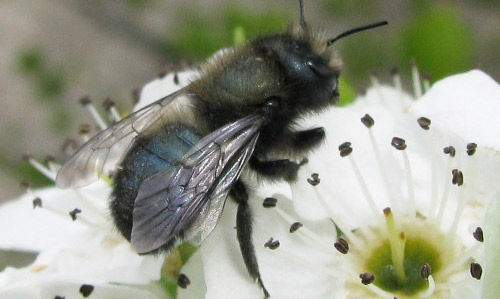
Neonicotinoid reduces fertility rates in bees
Two researchers at the University of California at Davis found that the neonicotinoid pesticide Imidacloprid May Reduce Fertility Rates in Blue Orchard Bees (Osmia lignaria). In his article published in Proceedings of the National Academy of Sciences, the group describes the test of the response of the valuable pollinator to the presence of imidacloprid.
Previous research has shown that Imidacloprid, a neonicotinoid pesticide, is harmful to all types of bees. But, as researchers observe with this new effort, little work has been done to determine whether the chemical has a generational impact on bees. In this new effort, the team sought to find out if the pesticide harms not only the bees impacted by its application., but also their descendants .
For this, captured a large number of blue orchard bees, a kind that resembles the bee, but it has a different color and collects pollen in the belly instead of the paws.. It is important for farmers who grow tree plantations, like almonds, peaches, apples and cherries. The captured bees were separated into small groups., each of which is exposed to Imidacloprid in different ways.. The researchers applied the pesticide to the plants inside the enclosure according to the instructions.. Some of the plants received multiple doses and others only one. Besides, some of the bees were exposed to the chemical while they were still larvae., others while they were young and others while they were mature. And still others have been exposed more than once during different stages of their life cycle..
The researchers found that bee larvae exposed to the chemical produced 20% fewer puppies after they become adults. They also found that multiple exposures led to even fewer offspring.. Those that were exposed as larvae, for example, and then exposed again as adults had 44% less descendants, which, observe the researchers, represents approximately 10 descendants to less than a normal group of 24.
The results show that the use of Imidacloprid in agricultural crops (which is banned in Europe, but not in the US) can lead to dramatic reductions in bee populations due to reductions in fertility rates.
Text extracted from: https://www.agrolink.com.br/noticias/neonicotinoide-reduz-taxas-de-fertilidade-em-abelhas_458856.html

Sorry, the comment form is closed at this time.